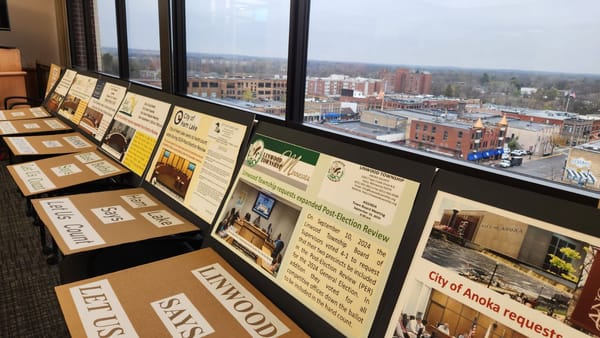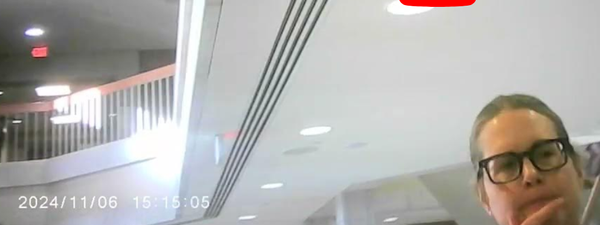1% or 100% ?
How to elevate transparency in electronic systems with ONE simple report
Did you know that post-election reviews (PER) check less than 1% of ballot positions (ovals) interpreted by the tabulators (scanners) provided by Dominion, ES&S, and Hart InterCivic used in Minnesota? PERs are also known as risk-limiting audits (RLA).
And yet, while election officials (often not elected, but rather appointed employees) in Minnesota continue to argue that the election of 2020 was completely secure. How can they know for sure if PERs check less than 1% of votes?
Even though precincts within counties to be reviewed by hand tally (against the machine tally) are chosen by lot (at random), it is then known days in advance the time and location of that post-election review.
Put your black hat on for a moment: if one knew where the review was taking place, how could one reconcile a potential variance between physical ballots and the reported machine tally?
Your right to vote and not have your vote cancelled
It is a constitutional right to vote and to not be disenfranchised, which without a forensic audit (physical and digitial records, including ballots, ballot images, cast vote records, and much more) of the state or even a small rural county, cannot be proven. The proof of a fair election, by the way, stands with the counties, whose commissioners certify their elections or trustworthy, not with the people asking for transparency.
How can the people gain access to information that would bring light to the fairness and security of elections?
One avenue is already built in to the machines.
It’s called the Cast Vote Record (CVR). (Link to CVRs for Dummies PDF)
Think of the CVR as an instant audit.
A stark contrast with PERs, cast vote records (CVR) show 100% of votes in an election.
Less than 1% or 100%, which is more transparent?
With a public data request to your county clerk and auditor, the CVR for any recent election by chapter 13 of data practices law must be turned over to you.
Minnesota is batting 0.000% on CVRs for 2020
No Minnesota county has been able to produce a cast vote record for the 2020 general election. Almost 100 counties around the country have. Minnesota’s current chief election official, Secretary of State Steve Simon has often spoke about voter confidence, but has denied Crow Wing County a forensic audit and not asked any clerks to produce cast vote records which would go a long way toward transparency.
As described in this book, Minnesota election employees seem little aware or unable to provide them. County attorneys have issued opinions in Todd County. The Chisago county clerk even admitted (audio) a security update had removed her ability to access it, possibly violating 52 USC §20701 and §20702.
The inability to produce this report begs the question: How did Minnesota’s votes get counted?
0/87 Minnesota counties, so far, have agreed to turn ON cast vote records for the August 9, 2022 primary election
General Counsel of the North Carolina election board, is sending communication to all the counties telling them that it's not legal to give out Cast Vote Records:
Dear Directors,
We have become aware that many of you are receiving requests for “cast vote records” (a.k.a “CVR”) or similar data for the November 2020 general election. As we understand these requests, they are seeking a compilation of data that can be generated from certain types of tabulators or central election management systems, which shows the voted selections for each ballot that was processed. You may not be familiar with such a report because running such a report is not part of typical election processes in North Carolina, and you would likely require instructions on how to generate it.
That said, and importantly, These are confidential under North Carolina law and as an election officials you are prohibited from disclosing them. See G.S. 163-165.1(e).
There is no letter that I have found yet in Minnesota suggesting against producing these reports, however the responses received from election officials and auditor/clerks sounds very similar, universally in the negative.
In the case of newer officials or employees, there is sometimes a willingness to help that is quickly dampened.
In Stearns County, the two election officials appeared not to have knowledge about cast vote records, but within 48 hours were able to share that they would not be turning them on for the August, 9 2022 primary election. Who was able to educate them so quickly?
In the Carver County commissioner board meeting on July 19, 2022, a secretary of state candidate called for all 87 counties to turn ON their cast vote record reports and make them immediately available after Minnesota’s August 9, 2022 open primary election.
This newsletter will be forever free but I do want to thank my 4 paid subscribers for their support. Their contribution, 3 x $6.39/month and 1 x $63.99 yearly has been used for expenses like travel to county commissioner meetings or meetings with election officials.
You can also support this work by purchasing a copy of [S]elections in Minnesota, available on B&N and Amazon (or call your local bookstore to have it ordered). This book is the best way I can think of to get up to speed on what happened in Minnesota in 2020 and what will likely happen in Minnesota in 2022, and a vision for true election integrity and full transparency.
Of course, if you wish to try before you buy, the book is available free here: https://leanpub.com/sim2020/read
And the audiobook is also free here: https://soundcloud.com/erikvanmech




